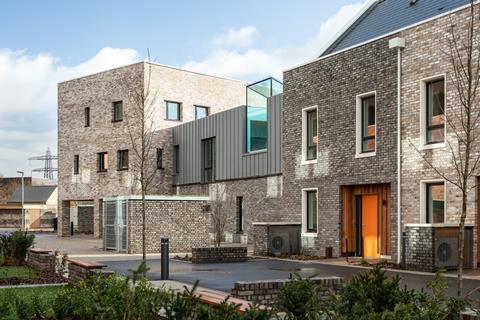Five housing schemes join low-carbon study programme

Building for 2050, the government’s project into research and development around low-carbon housing, has signed up five new schemes for its study programme.
Led by an Aecom-headed team which includes architect Pollard Thomas Edwards, low-carbon technology specialist Delta-ee and building performance group Four Walls and backed with £1.4m of money from the Department for Business, Energy and Industrial Strategy, the project was announced as part of the government’s Construction Sector Deal in 2017.
It is due to be completed in 2020.
Alison Crompton, Aecom’s regional director for sustainability, building and places, said: “Signing up these five pioneering projects for our research is an important step towards future-proofing new homes, paving the way for every new house in England and Wales to be low-carbon and energy-efficient.
“From early design right through to occupation, we’ll be combining technical and building performance reviews with social research to identify both the barriers and drivers of building low-carbon new homes at scale,” she added.
The project team said it will seek the views of funders, developers and design teams, as well as contractors and those site-based staff already building low-carbon homes. Residents will also be consulted, it added.
The five housing developments are:
Active Homes, Neath, is a small development of 16 homes for social rent by housing association Pobl Group. Designed as mini power stations, they use battery technology, heat pumps and solar PV to generate around 80% of the energy they consume.
Rayne Park, Norwich, is the largest low-energy Passivhaus development in the UK and one of the largest in Europe. Brought forward by Norwich Regeneration, the scheme will see 112 of the 172 new homes certified to the Passivhaus standard.
Etopia Homes, Corby, is a scheme of 47 modular homes equipped with energy-saving technology – a combined solar photovoltaic and thermal panel, heat pump, inter-seasonal storage and smart home equipment – to deliver a net zero-carbon standard on site.
Marmalade Lane, Cambridge, is a custom-built cohousing community. Made up of 42 custom build homes, the scheme has been designed with a fabric-first approach delivered with offsite manufactured closed timber panels supplied by Swedish builder Trivselhus.
Tallack Road, Leyton, comprises a mix of 50 new affordable and private flats and houses. The development is the first to use a large-scale communal air source heat pump feeding an ambient temperature heat network and individual heat pumps, together with solar photovoltaic panels.
Source: PTA







No comments yet